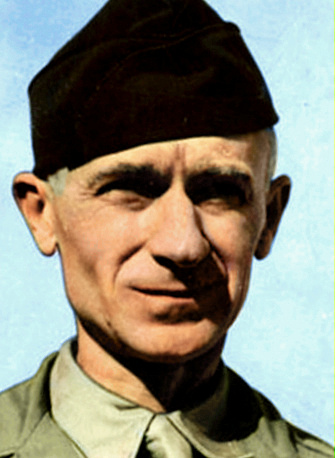The Pittsburgh Press (March 15, 1945)

Roving Reporter
By Ernie Pyle
IN THE WESTERN PACIFIC (delayed) – An aircraft carrier is a noble thing. It lacks almost everything that seems to denote nobility, yet deep nobility is there.
A carrier has no poise. It has no grace. It is top-heavy and lopsided. It has the lines of a well-fed cow.
It doesn’t cut through the water like a cruiser, knifing romantically along. It doesn’t dance and cavort like a destroyer. It just plows. You feel it should be carrying a hod, rather than wearing a red sash.
Yet a carrier is a ferocious thing, and out of its heritage of action has grown its nobility. I believe that today every Navy in the world has as its No. 1 priority the destruction of enemy carriers. That’s a precarious honor, but it’s a proud one.
My carrier is a proud one. She’s small, and you have never heard of her unless you have a son or husband on her, but still she’s proud, and deservedly so.
She has been at sea, without returning home, longer than any other carrier in the Pacific, with one exception. She left home in November 1943.
She is a little thing, yet her planes have shot 238 of the enemy out of the sky in air battles, and her guns have knocked down five Jap planes in defending herself.
Has sunk 29 big ships
She is too proud to keep track of little ships she destroys, but she has sent to the bottom 29 big Japanese ships. Her bombs and aerial torpedoes have smashed into everything from the greatest Jap battleships to the tiniest coastal schooners.
She has weathered five typhoons. Her men have not set foot on any soil bigger than a farm-sized uninhabited atoll for a solid year. They have not seen a woman, white or otherwise, for nearly ten months. In a year and a quarter out of America, she has steamed a total of 149,000 miles!
Four different air squadrons have used her as their flying field, flown their allotted missions, and returned to America. But the ship’s crew stays on – and on, and on.
She is known in the fleet as “The Iron Woman,” because she has fought in every battle in the Pacific in the years 1944 and 1945.
Her battle record sounds like a train-caller on the Lackawanna Railroad. Listen – Kwajalein, Eniwetok, Truk, Palau, Hollandia, Saipan, Chichi Jima, Mindanao, Luzon, Formosa, Nansei Shoto, Hong Kong, Iwo Jima, Tokyo… and many others.
She has known disaster. Her fliers who have perished could not be counted on both hands, yet the ratio is about as it always is – about one American lost for every 10 of the Exalted Race sent to the Exalted Heaven.
She has been hit twice by Jap bombs. She has had mass burials at sea… with her dry-eyed crew sewing 40-mm shells to the corpses of their friends, as weights to take them to the bottom of the sea.
Yet she has never even returned to Pearl Harbor to patch her wounds. She slaps on some patches on the run, and is ready for the next battle. The crew in semi-jocularity cuss her chief engineer for keeping her in such good shape they have no excuse to go back to Honolulu or America for overhaul.
Like a small city
My carrier, even though classed as “light,” is still a very large ship. More than 1,000 men dwell upon her. She is more than 700 feet long.
She has all the facilities of a small city. And all the gossip and small talk too. Latest news and rumors have reached the farthest cranny of the ship a few minutes after the captain himself knows about them. All she lacks is a hitching rack and a town pump with a handle.
She has five barbers, a laundry, a general store. Deep in her belly she carries tons of bombs. She has a daily newspaper. She carries firefighting equipment that a city of 50,000 back in America would be proud of.
She has a preacher, she has three doctors and two dentists, she has two libraries, and movies every night, except when they’re in battle. And still she is a tiny thing, as the big carriers go. She is a “baby flattop.” She is little. And she is proud.
She has been out so long that her men put their ship above their captain. They have seen captains come and go, but they and the ship stay on forever.
They aren’t romantic about their long stay out here. They hate it, and their gripes are long and loud. They yearn pathetically to go home. But down beneath, they are proud – proud of their ship and proud of themselves. And you would be too.